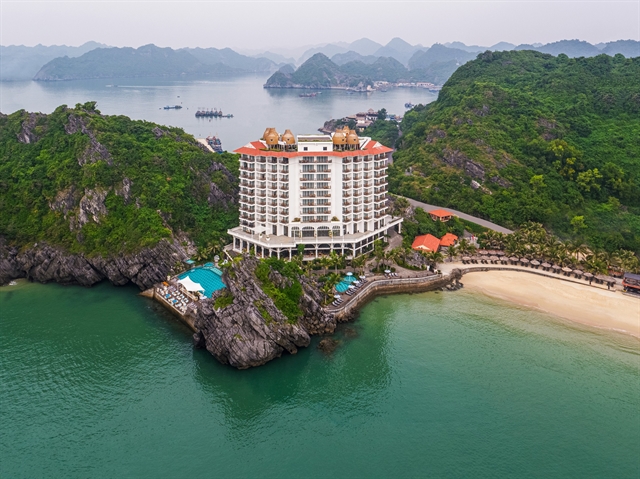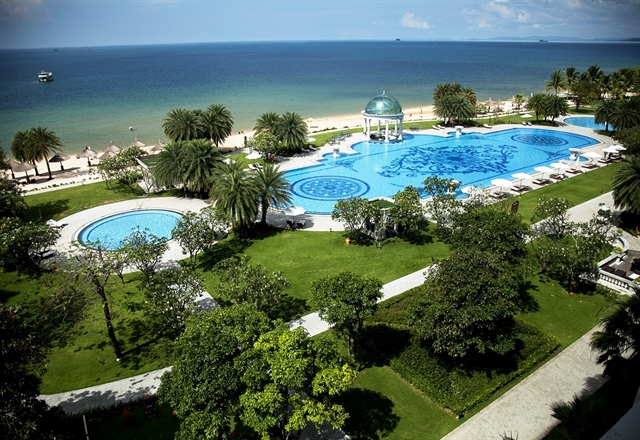 Society
Society

 |
| A luxury resort on Phú Quốc Island, Kiên Giang Province. — VNA/VNS Photo |
HÀ NỘI — Many tourist destinations are staring down the prospects of tourist dearth by the end of the year due to high air ticket prices.
Since early September, there have been many conflicting views on domestic airline ticket prices on the country's primary flight route connecting the two biggest cities, Hà Nội – HCM City, or tickets to popular tourist beach destinations such as Phú Quốc Island and Nha Trang that are still high despite entering the low season.
Travel agencies have expressed concern that this could affect demand for air travel.
However, in the current context, it is difficult for domestic airlines to lower air ticket prices any further after more than two years of struggling with the severe economic consequences of the COVID-19 pandemic.
Most domestic airlines are still operating below cost because revenue has not recovered as compared to the levels of the pre-pandemic period, and input costs are constantly fluctuating.
Specifically, fuel is a capital cost that accounts for 36 per cent of an airline's transportation fee, and by the end of 2022, it increased to more than US$120 per barrel, an increase of more than 85 per cent compared to the average level of about $67 per barrel in 2015.
Currently, prices of Jet A1 fuel have cooled down, but are still anchored at around $90 per barrel.
At the end of the year, global travel demand dramatically increases, so fuel prices are still predicted to continue to stay high.
If fuel costs rise by $1 per barrel, Vietnam Airlines – the national carrier – is estimated to incur more than VNĐ220 billion ($9 million) in additional costs.
Exchange rates also greatly impact the operations of Vietnamese airlines. Vietnam Airlines said more than 70 per cent of air transportation costs must be paid in foreign currencies while ticket sales revenue in Việt Nam is in Vietnamese đồng.
Therefore, fluctuations in the exchange rate between US dollars and Vietnamese đồng directly affect the company's business performance.
The dong depreciated from VNĐ21,900 a dollar in 2015 to 23,350 a dollar last year.
This factor increased the company's costs by 4.35 per cent, and this year the dong is forecast to weaken by 3 per cent.
Earlier this month, Vietravel Airlines said they were facing similar difficulties.
This business has also struggled to repay previously incurred debts along with increased interest rates in recent times.
Having the smallest scale in the domestic airlines market today, Vietravel Airlines admitted that it was in a difficult situation given that revenue from air tickets sold was not enough to offset costs.
For many years, during the Tết (Lunar New Year) holiday season, one-way tickets have been sold out.
According to Vietjet Air, bringing the cost of travelling by plane down to the level of travelling by train or car is unthinkable.
Airlines are the central core of the aviation industry, but are vulnerable and unstable.
Meanwhile, many supporting businesses of the industry such as airports, ground services and catering had made large profits, said the airlines’ representative.
Đinh Việt Thắng, Director-General of the Civil Aviation Administration of Việt Nam, also said that ticket prices offered by airlines depended on the laws of supply and demand and special policies from time to time, but were still within the ticket price ceiling.
When the price offered is high but cannot be sold, airlines have to research and adjust the price, according to Thắng.
Regarding some famous tourist destinations in the country that have faced a lack of visitors, many businesses and experts believe that the massive development of too many hotels and resorts is no longer attractive to customers as before.
Many domestic tourists also have a bad impression of certain tourist destinations due to poor management of security and safety, as well cut-throat prices of taxis and restaurant services.
According to Savills, a property agent, Phú Quốc Island in Kiên Giang Province does not have many options for budget tourists.
According to statistics, 70 per cent of 3-5 star hotel rooms in the Mekong (Cửu Long) Delta region are concentrated on the island.
This segment will be affected immediately if the current economic situation turns more difficult and consumers cut back on spending.
To overcome difficulties in Phú Quốc as well as other tourist destinations, coordination is needed between management agencies, local authorities, travel and service businesses and airlines.
At a recent meeting of the government and businesses to "rescue" Phú Quốc Island tourism, a representative of an airline also affirmed its readiness to cooperate with local authorities to promote the industry.
However, the airline said that tourist businesses also needed to review the prices of services and products provided to tourists. — VNS